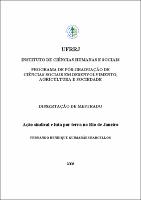Use este identificador para citar ou linkar para este item:
https://rima.ufrrj.br/jspui/handle/20.500.14407/11646| Tipo do documento: | Dissertação |
| Título: | Ação sindical e luta por terra no Rio de Janeiro |
| Título(s) alternativo(s): | Trade union action and struggle for land in Rio de Janeiro |
| Autor(es): | Barcellos, Fernando Henrique Guimarães |
| Orientador(a): | Medeiros, Leonilde Servolo de |
| Palavras-chave: | sindicalismo rural;conflito por terra;Rio de Janeiro;rural syndicate;land conflicts |
| Área(s) do CNPq: | Sociologia |
| Idioma: | por |
| Data do documento: | 25-Fev-2008 |
| Editor: | Universidade Federal Rural do Rio de Janeiro |
| Sigla da instituição: | UFRRJ |
| Departamento: | Instituto de Ciências Humanas e Sociais |
| Programa: | Programa de Pós-Graduação em Ciências Sociais em Desenvolvimento, Agricultura e Sociedade |
| Citação: | BARCELLOS, Fernando Henrique Guimarães. Ação sindical e luta por terra no Rio de Janeiro. 2008. 111 f. Dissertação (Mestrado em Ciências Sociais em Desenvolvimento, Agricultura e Sociedade) - Instituto de Ciências Humanas e Sociais, Universidade Federal Rural do Rio de Janeiro, Seropédica - RJ, 2008. |
| Resumo: | O objetivo deste trabalho é estudar as continuidades e rupturas da ação da Federação dos Trabalhadores na Agricultura do Estado do Rio de Janeiro (FETAG) nos conflitos de terra no estado. O recorte temporal é demarcado pelos primeiros passos do sindicalismo rural no Brasil, no período compreendido entre 1945 e 1964, ano do golpe militar. Identificamos as principais forças em cena, suas formas de organização e luta, atentando para as mudanças ao longo do tempo e também para quem detinha o controle das organizações. Reconstituímos a cultura política que a FETAG, quando surge, deixa para a FETAG após o golpe militar, em 1964. O segundo momento vai de 1964 até o início dos anos 70. Caracterizamos como a FETAG historia as condições dos conflitos de terra, sua percepção e definição do que pode ser qualificado como legítimo de reivindicar em cada momento histórico, as justificativas que se consideram apropriadas de serem usadas para encaminhar esses conflitos e o processo de constituição das reivindicações. Apresentamos suas principais demandas, como condição para entender quem eram os trabalhadores, para quem e de quem a FETAG falava e como se procurava traduzir este encontro. No terceiro momento, arrolamos sobre o enraizamento de práticas de luta da FETAG, suas modificações e sua intensidade nos anos 1960 e 1970. Identificamos a entrada em cena de novas forças e as transformações das estratégias de luta de meados dos anos 70 até o início dos anos 80, atentando ainda para o diálogo com o Estado e as outras forças que se apresentavam como opositoras ou aliadas. Foram utilizados procedimentos qualitativos de pesquisa, articulando-se a análise de narrativas ao estudo de referências teóricos e documentais. |
| Abstract: | The present dissertation aims to investigate the development of the actions of The Agricultural Workers Federation of Rio de Janeiro State FETAG ( Federação dos trabalhadores na Agricultura do Estado do Rio de Janeiro) on the land s conflicts in the state. The horizon of time to be studied is divided in three distinct periods. The first one is from 1945 to 1964. The second one is from 1964 to the begging of the 1970 s. And the last one goes from the middle of the 1970 s to the beginning of the 1980 s. In the first period, which is characterized by the beginning of the rural unionism in Brazil and ends with the coup d etat in 1964, it is identified the main forces on the scene, the way they were organized and how they used to fight, observing both who had the power of the organizations and the main changes that took place during the period. In the second period, the way the FETAG registered the conditions of the land s conflicts, its perception and definition of what was legitimate to be claimed in each historical moment and the arguments considered appropriate and legitimate of being used to direct such conflicts are taking into account. In addition, we used that background to understand who was the main actors to whom and for whom FETAG was interested to convey. In the third and last period, we shed light to the practices of fight of The FETAG, its changes and intensity during these years. During that time, it is possible to identify new forces in scene and the transformation of the strategies of fight along with the beginning of the dialog with the State and with other opponent or allied forces. To carry on this research we have used qualitative procedures, which articulates the analysis of narratives to the theoretical and documentary references. |
| URI: | https://rima.ufrrj.br/jspui/handle/20.500.14407/11646 |
| Aparece nas coleções: | Mestrado em Ciências Sociais em Desenvolvimento, Agricultura e Sociedade |
Se for cadastrado no RIMA, poderá receber informações por email.
Se ainda não tem uma conta, cadastre-se aqui!
Arquivos associados a este item:
| Arquivo | Descrição | Tamanho | Formato | |
|---|---|---|---|---|
| 2008 - Fernando Henrique Guimaraes Barcellos.pdf | 1.45 MB | Adobe PDF |  Abrir |
Os itens no repositório estão protegidos por copyright, com todos os direitos reservados, salvo quando é indicado o contrário.

